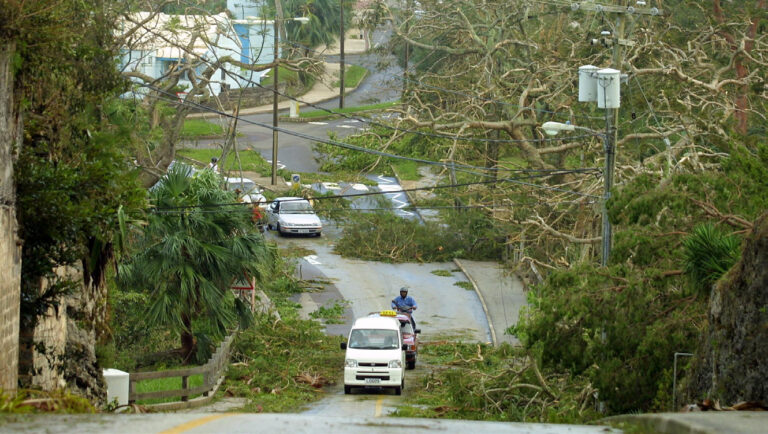by Tim Smith
The best way to make sure your family stays safe in a storm is to involve them all in your preparation plans from the beginning. Not only will this help increase everybody’s awareness of danger and sense of responsibility, but they might just remember some vital things you forget as you hurry around before an approaching hurricane.

“Your hurricane plan should be a family agreement,” says Steve Cosham, Bermuda’s national disaster coordinator. “You should get your children involved so they can help you and learn by your actions. It develops good habits.”
It can also help parents ensure they don’t miss anything. “For example, you might not have a chance to go through your first aid kit to check you haven’t run out of anything. Let’s involve the children in checking and making sure it’s all stocked up.”
This approach will ensure everyone understands their role in a storm and remove some fear of the unknown. “I have got an 11-year-old girl and we involve her in our household preparations,” Cosham says. “My daughter took me down to a hardware store and picked out a nice blue flashlight. When a hurricane comes, she carries it around with her and sleeps with it under her pillow. It gives her a sense of security. Something simple like that can make a big difference.”
At your family meeting, talk about the room in the house that is most suitable for riding out the storm. Usually, this will be a strong room where you can sit comfortably and not too close to windows. Depending on the size of your family, you may also need room for the children to play games.
Other items to discuss include:
- How will you keep in contact with each other when news breaks that a storm is approaching? Compile a list of emergency numbers that is saved in a spot that everyone knows about.
- Who is best placed to carry out first aid and CPR during an emergency? If nobody has been trained recently, contact St. John Ambulance at 236-7831.
- Where is the safest place to store your essential items during the storm?
- Who will be responsible for carrying out each task as you prepare for the storm? Make sure to involve the children in some of the straightforward tasks.
- Does everyone know the escape routes from each room? Where will you go if the room you are planning to ride out the storm becomes unsafe?
- How will you make sure your pets are safe during the storm?
Cosham says: “You need to have these discussions with the family long before a storm comes. They all need to know what they are going to do if a window breaks because there’s going to be panic. If you have already discussed your plan, it will help people to stay calm.”
As the storm approaches and you have made sure you are topped up on all your essential items and all your property is secured, it’s time to hunker down and stay safe. The best way to do this is to keep yourselves as well informed as possible. Monitor the Bermuda Weather Service (BWS) website, weather.bm, for as long as you have internet access. Listen to the government’s emergency broadcast station on 100.1 FM for updates at the top and bottom of every hour.
“The music list has been upgraded in the last couple of years!” Cosham jokes. “We don’t often get a lot of news during the hurricane, but we report what we do know and it gives people a sense of safety.”
When a hurricane warning is in place, the National Hurricane Centre issues advisories which are represented on the BWS website. Information is also posted on the BWS Facebook page and short updates are sometimes provided on Facebook Live.
Some family members may be tempted to go outside when the hurricane’s eye passes overhead and the fierce winds are suddenly replaced by a stillness and clear blue skies. This merely means the storm is at its halfway point. After an unpredictable length of time, we will quickly find ourselves back under the eyewall, which boasts some of the storm’s strongest winds. The Emergency Measures Organisation will report when it is safe to leave your home via the 100.1 FM channel. Do not take any risks before then.
Once it is safe to venture outside your home, you and your family will be keen to assess any damage to your property and surrounding areas. The message from health and safety experts is to exercise severe caution.

That’s why Joshua Correia, the training officer at St. John Ambulance Bermuda, stresses the importance of staying up-to-date with your first aid training. “Even the basic skills can be helpful in an emergency situation,” he says. “Starting that bleeding control before an ambulance arrives can be the difference between life and death.”
Correia adds: “We have seen a lot of people going outside in the eye of the storm, or after a storm, and are not necessarily familiar with the lay of the land. Shrubbery may have blown around or pieces of corrugated metal may have blown into your yard. This can cause broken bones as people trip over it.”
Cosham and Correia both point to a trend of people lighting barbecues inside their homes–something at the top of the list of things not to do. As well as a fire risk, Correia says it causes a threat of carbon monoxide poisoning which can be quickly fatal to the entire household.
“Don’t light a barbecue in your house. It happens every time we have a big storm coming,” he says.

